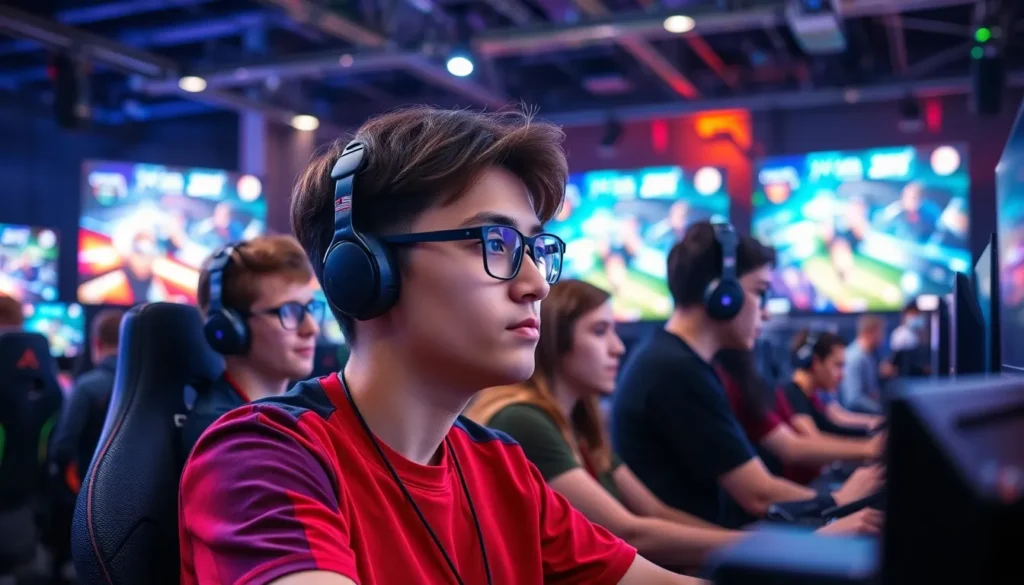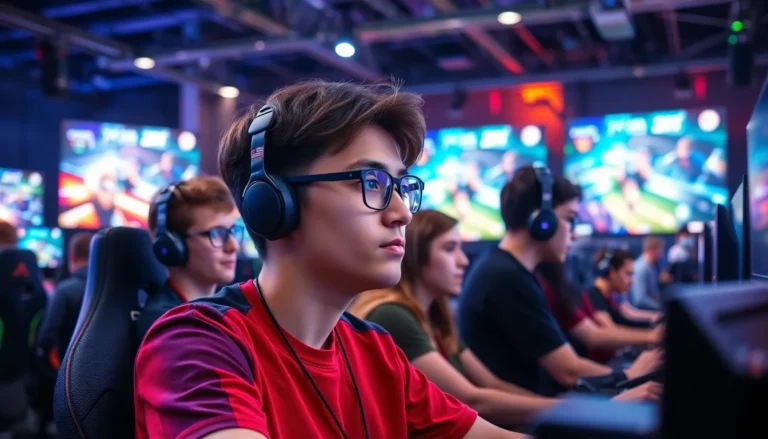Table of Contents
ToggleIn a world where gaming isn’t just a hobby but a booming industry, remote esports jobs are the golden ticket many have been waiting for. Imagine trading your office cubicle for a gaming chair while still making a living doing what you love. Sounds dreamy, right? With the rise of competitive gaming, opportunities to work in this dynamic field are sprouting like mushrooms after a rainstorm.
Overview of Remote Esports Jobs
Remote esports jobs encompass a variety of roles that cater to different skills within the gaming industry. Opportunities include positions such as game developers, content creators, community managers, and esports analysts. Increasing demand for skilled professionals drives this job market, promoting work-from-home arrangements.
Game developers play a crucial role in creating engaging titles that captivate audiences. Their contributions involve everything from coding to graphic design, requiring both creativity and technical expertise. Likewise, content creators focus on producing captivating videos, streams, and articles that resonate with gaming enthusiasts.
Community managers ensure player engagement by fostering positive environments. They handle interactions across various platforms, addressing player concerns and promoting community events. Additionally, esports analysts interpret data to inform teams and organizations, enhancing strategies and performance metrics.
Esports organizations and gaming companies often seek individuals with passion for gaming and an understanding of industry trends. Flexibility in job roles enables professionals to balance their work and personal lives while being part of a thriving industry. Remote opportunities appeal particularly to those seeking non-traditional work environments.
Statistical growth in the gaming sector supports this shift. In 2021, the global esports market was valued at approximately $1.08 billion and is projected to reach $1.62 billion by 2024. This upward trend underscores the significant career potential within remote esports jobs.
Individuals looking to enter this field should focus on building relevant skills and networking within the gaming community. Online courses and certifications in game design, marketing, and game analysis enhance employability prospects. Engaging with platforms dedicated to esports can lead to valuable connections and opportunities in this dynamic industry.
Types of Remote Esports Jobs
Remote esports jobs encompass various roles that cater to a diverse skill set within the gaming industry. Each job type offers unique responsibilities and opportunities for individuals passionate about gaming.
Game Tester Positions
Game testers play a crucial role in the development process. They identify bugs and provide feedback on gameplay mechanics to enhance player experience. The position often requires attention to detail and analytical skills. Testers often collaborate with developers to ensure games meet quality standards before release. Many organizations value testers who possess strong gaming knowledge and are familiar with different platforms.
Esports Coach Roles
Esports coaches focus on improving team performance through strategy and skill development. These professionals analyze gameplay footage, identify strengths and weaknesses, and guide players in honing their skills. Communication skills are vital for coaches, as they must effectively convey tactics and foster a positive team environment. Coaches often have experience in competitive gaming, providing valuable insights to enhance overall team synergy.
Content Creator Opportunities
Content creators generate engaging material that attracts viewers and builds community engagement. They produce videos, live streams, and articles that cover game reviews, tutorials, and esports news. Creativity and strong communication skills significantly benefit those in this role. Typically, creators grow their audience on platforms like YouTube and Twitch, fostering connections with fellow gamers. Successful content creators often stay informed about industry trends and understand audience preferences to tailor their content effectively.
Skills Required for Remote Esports Jobs
Remote esports jobs require a blend of various skills to thrive in a competitive landscape. These skills contribute to effective performance in roles across game development, content creation, community management, and analytics.
Technical Skills
Technical skills form the backbone of remote esports roles. Game developers must understand programming languages such as C++ or Python to create dynamic gaming environments. Familiarity with game engines like Unity or Unreal Engine enhances a developer’s capabilities. Content creators utilize software for video editing, animations, and graphics to produce high-quality content. Community managers benefit from knowledge of social media platforms and tools for analytics, enabling them to engage effectively with players. Meanwhile, esports analysts leverage data analysis tools to interpret player and game statistics. Mastery of these technical skills increases employability in the growing esports market.
Communication Skills
Communication skills play a crucial role in remote esports jobs. Written and verbal communication is vital for content creators who engage audiences through scripts, articles, and live commentary. Clarity helps convey ideas and strategies effectively. Community managers must excel in interpersonal communication, fostering connections with players and building community culture. They often serve as the liaison between players and developers. Esports analysts also require solid communication abilities to present data insights to teams and stakeholders, ensuring strategies are understood. These skills enhance collaboration across various teams within the esports industry.
Benefits of Working in Remote Esports Jobs
Flexible work environments stand out as a major benefit of remote esports jobs. Individuals can create schedules that fit their lifestyles, increasing productivity and job satisfaction. Streamlined communication tools support collaboration among teams, ensuring smooth workflow across different locations.
Exposure to a global audience enhances career opportunities in esports. Employees connect with fans and professionals worldwide, fostering valuable relationships. The growth of the global esports market, projected to rise from $1.08 billion in 2021 to $1.62 billion by 2024, showcases the potential for job stability and career advancement.
Access to diverse roles allows talent to find their niche in the gaming industry. Whether one prefers coding, content creation, or analytics, various positions cater to different skills. Game developers, content creators, and community managers each play crucial roles in expanding the esports ecosystem.
Remote work eliminates lengthy commutes, saving time and reducing stress. This benefit directly translates to improved work-life balance. Employees can focus more on personal interests and gaming passions outside of work.
Additionally, collaboration with various esports organizations offers professional growth. Each collaboration brings fresh insights and experiences, enhancing individual skill sets. Involvement in major projects leads to stronger portfolios, which attract future employment opportunities.
Continuous learning is a defining feature of remote esports jobs. Access to online courses and industry resources helps individuals stay updated on trends and technologies. This ongoing education supports skill enhancement and career development.
Ultimately, remote esports jobs combine passion for gaming with fulfilling work opportunities. The landscape encourages career growth while catering to personal lifestyles and interests, without sacrificing professional aspirations.
Challenges Faced in Remote Esports Jobs
Navigating remote esports jobs presents several unique challenges. Communication barriers often arise in virtual teams, leading to misunderstandings that can hinder project progress. Adapting to time zone differences complicates coordination, especially when team members are spread across various regions. Maintaining work-life balance proves difficult as the lines between personal and professional life blur in home settings.
Isolation can also become a significant issue. Many remote workers miss the camaraderie and spontaneous interactions typical of office environments. Staying engaged and motivated often requires conscious effort in remote settings. Companies frequently encounter challenges in fostering a cohesive team culture, impacting morale and collaboration.
Learning new tools and technologies is essential, but this can be overwhelming for some individuals. Constant updates and shifts in the gaming landscape necessitate continuous skill improvement, placing pressure on workers to stay current. Additionally, some remote esports jobs may lack a clear career progression path, making it tricky for employees to envision their future in the industry.
Job seekers might also face increased competition. The growing esports market attracts more candidates, creating a saturated job landscape. Performance evaluations can present obstacles, as remote settings complicate traditional assessment methods. Organizations may struggle to track productivity effectively, leaving employees feeling undervalued.
Lastly, securing stable internet connections is critical. Technical issues can disrupt workflows and impact collaboration. Maintaining a professional online presence requires consistent effort, which can be daunting for those unfamiliar with digital branding practices. Addressing these challenges effectively can enhance the overall remote working experience in the esports sector.
Conclusion
Remote esports jobs offer a unique blend of passion and profession in an ever-expanding industry. As the gaming sector continues to grow, these roles provide flexibility and opportunities for individuals to thrive in a dynamic environment.
With various positions available, from game developers to content creators, there’s something for everyone looking to make their mark in esports. While challenges exist in remote work settings, the benefits often outweigh the drawbacks, fostering a fulfilling career path.
Those eager to enter this field should focus on honing their skills and building connections within the gaming community. Embracing the evolving landscape of remote esports jobs can lead to exciting and rewarding career opportunities.








